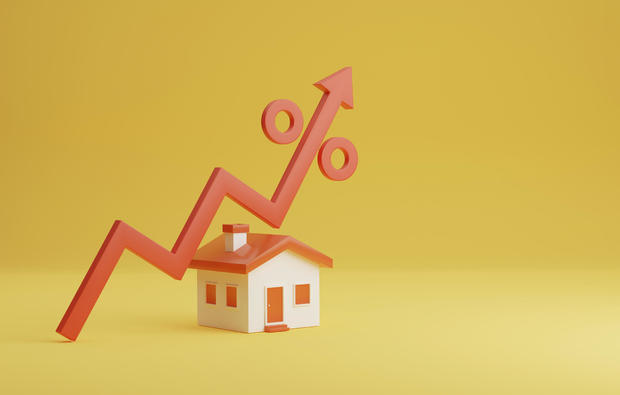Will mortgage rates drop in 2023? Here's what experts think
The Federal Reserve has been working to tame inflation for nearly 18 months now, approving 11 hikes to its benchmark interest rate since March 2022. Those moves — along with other economic factors — have pushed mortgage rates up considerably in that time. In fact, since last March, the average rate on 30-year mortgage loans has jumped from under 4% to 7.23% today, according to Freddie Mac. Mortgage interest rates are currently the highest they have been since 2000.
That's a far cry from the sub-3% rates the market saw in 2020 and 2021 — and a significant barrier for many hopeful homebuyers.
Fortunately, mortgage rates fluctuate constantly, so they won't stay that high forever. Just how long could those elevated rates stick around? And when can consumers expect lower rates once again? We asked a few experts for their opinion.
Explore your mortgage rate options here now to see what you qualify for.
Where are mortgage interest rates headed?
There's no way to tell for sure, but most experts and industry groups think rates are at or near their peak. As Matt Clarke, chief operating officer of Churchill Mortgage, puts it, "We're approaching a glass ceiling where rates going too much higher would be detrimental to other critical aspects of the economy."
Still, rates being at their peak doesn't necessarily mean they'll decrease. For that to happen, inflation would need to slow, investments into mortgage-backed securities would need to increase and the Federal Reserve would need to ease up on its rate hikes.
According to the CME Group's Fed Watch tool, there's only about an 18% chance the Fed increases its rate at its upcoming September meeting. For its November meeting, the chances are higher (though that's still a way out and a lot could change before then).
"Inflation needs to slow, and unemployment needs to start creeping up," says Jerry Schiano, CEO at home equity lender Spring EQ. "I think unemployment will start increasing before year-end. Consumers are stressed, and that could lead to less buying and pullback by companies."
If this happens, the Fed could ease up on its benchmark rate hikes and mortgage rates may decrease as well.
Explore your mortgage purchase and refinance rate options here to learn more.
When will mortgage interest rates drop?
Realtor.com, Fannie Mae, the National Association of Realtors, and the Mortgage Bankers Association all expect mortgage rates to be slightly lower by the end of the year, with predictions ranging from 6% to 6.7% on average.
That's a drop — but not anything significant. For reference, a 7.23% rate (today's average) on a 30-year $400,000 loan comes with about a $2,723 monthly payment. At 6.7%, it falls to $2,581 — just a $142 difference.
"I expect mortgage rates to stay elevated through most of 2024," says John Paasonen, co-founder and CEO of Maxwell, a mortgage technology provider.
More notable dips in rates are probably much further down the line — possibly by 2025, Clarke says.
"I think significantly lower rates — back to the 5% range — could realistically happen in 2025, with 2024 beginning a slow trend downward," Clarke says.
Note that he says 5% — not the 2 to 3% rates we saw a few years ago. According to all three experts, those record-low numbers aren't returning any time soon (and they may never).
"Let's just say I'm glad I locked into a 2.6% mortgage rate on my own home," Paasonen says. "The market will restabilize at a new norm, likely within the next 12 to 18 months. That new norm most certainly will not be below 3% — that was a unique attribute of the amount of economic stimulation following a global pandemic."
Getting a mortgage in the meantime
Until that new norm is achieved, taking out a mortgage is going to be more expensive than it has been in years past. You also may want to think carefully about selling your home if you're one of the many who took advantage of those ultra-low mortgage rates.
"Anybody who took record low rates made a great decision," Schiano says. "They are saving a lot of money each month and should think carefully before refinancing or even selling their house."
If buying a new home is necessary, though, there are strategies for getting a lower mortgage interest rate. You can buy points, negotiate a temporary buydown, or consider a lower-rate mortgage product, like a 15-year loan or adjustable-rate mortgage. VA loans and USDA loans also tend to have lower rates than other mortgage options (if you can qualify for them).




